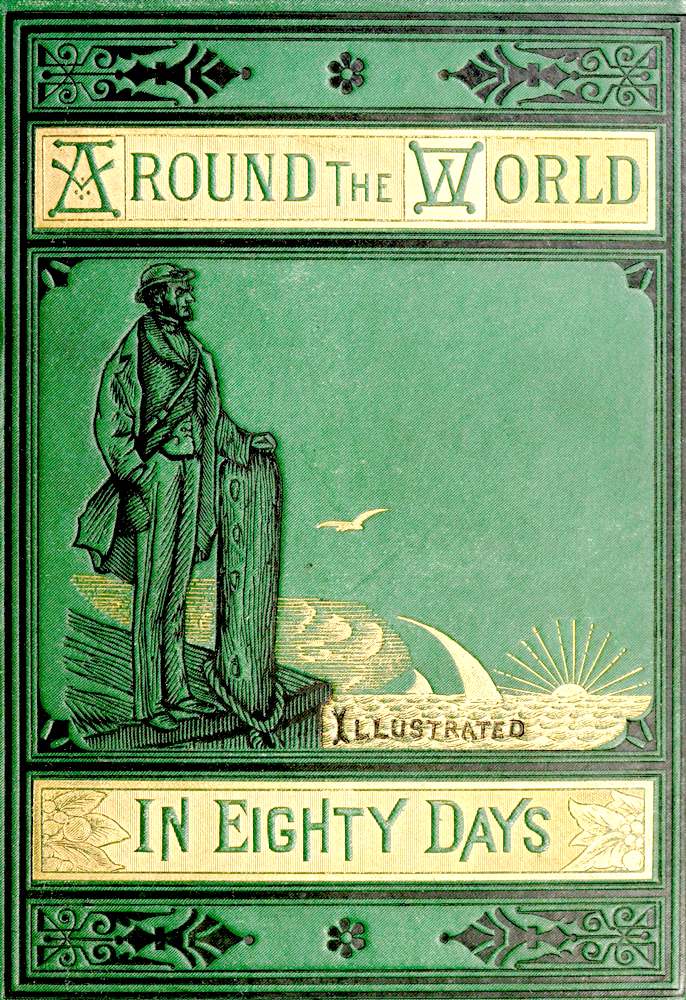|
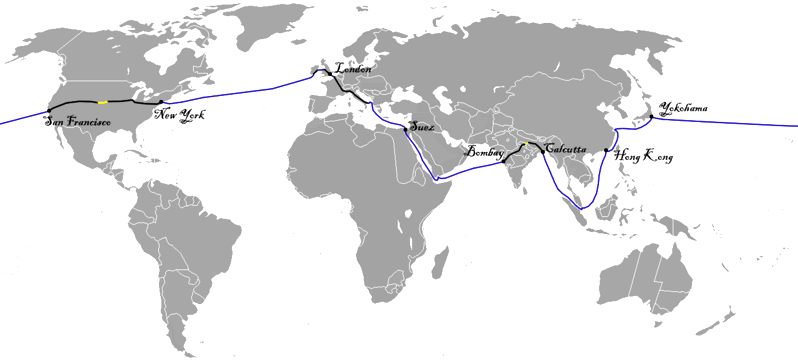
Map
of the route taken by Phileas Fogg, starting in London, then proceeding
east to Suez, Bombay, Calcutta, Hong Kong , Yokohama, San Francisco, New
York, and across the Atlantic
ocean to Ireland, then Liverpool England, and back to London. The route
planner below is for a circumnavigation on water in under 80 days, using
hydrogen, as per the author's prediction in The Mysterious Island. It
would be a major achievement if this was arranged to honor the 150th
anniversary of his publication.
<<<<
CHAPTER
VIII.
IN WHICH PASSEPARTOUT TALKS RATHER MORE, PERHAPS, THAN IS PRUDENT
Fix soon rejoined
Passepartout, who was lounging and looking about on the quay, as if he did not feel that he, at least, was obliged not to see anything.
“Well, my friend,” said the detective, coming up with him, “is your passport visaed?”
“Ah, it’s you, is it, monsieur?” responded Passepartout. “Thanks, yes, the passport is all right.”
“And you are looking about you?”
“Yes; but we travel so fast that I seem to be journeying in a dream. So this is
Suez?”
“Yes.”
“In Egypt?”
“Certainly, in Egypt.”
“And in Africa?”
“In Africa.”
“In Africa!” repeated Passepartout. “Just think, monsieur, I had no idea that we should go farther than Paris; and all that I saw of Paris was between twenty minutes past seven and twenty minutes before nine in the morning, between the Northern and the Lyons stations, through the windows of a car, and in a driving rain! How I regret not having seen once more Père la Chaise and the circus in the Champs Elysées!”
“You are in a great hurry, then?”
“I am not, but my master is. By the way, I must buy some shoes and shirts. We came away without trunks, only with a carpet-bag.”
“I will show you an excellent shop for getting what you want.”
“Really, monsieur, you are very kind.”
And they walked off together, Passepartout chatting volubly as they went along.
“Above all,” said he; “don’t let me lose the steamer.”
“You have plenty of time; it’s only twelve o’clock.”
Passepartout pulled out his big watch. “Twelve!” he exclaimed; “why, it’s only eight minutes before ten.”
“Your watch is slow.”
“My watch? A family watch, monsieur, which has come down from my great-grandfather! It doesn’t vary five minutes in the year. It’s a perfect
chronometer, look you.”
“I see how it is,” said Fix. “You have kept London time, which is two hours behind that of Suez. You ought to regulate your watch at noon in each country.”
“I regulate my watch? Never!”
“Well, then, it will not agree with the sun.”
“So much the worse for the sun, monsieur. The sun will be wrong, then!”
And the worthy fellow returned the watch to its fob with a defiant gesture. After a few minutes silence, Fix resumed: “You left London hastily, then?”
“I rather think so! Last Friday at eight o’clock in the evening, Monsieur Fogg came home from his club, and three-quarters of an hour afterwards we were off.”
“But where is your master going?”
“Always straight ahead. He is going round the world.”
“Round the world?” cried Fix.
“Yes, and in eighty days! He says it is on a wager; but, between us, I don’t believe a word of it. That wouldn’t be common sense. There’s something else in the wind.”
“Ah! Mr. Fogg is a character, is he?”
“I should say he was.”
“Is he rich?”
“No doubt, for he is carrying an enormous sum in brand new banknotes with him. And he doesn’t spare the money on the way, either: he has offered a large reward to the engineer of the ‘Mongolia’ if he gets us to Bombay well in advance of time.”
“And you have known your master a long time?”
“Why, no; I entered his service the very day we left London.”
The effect of these replies upon the already suspicious and excited detective may be imagined. The hasty departure from London soon after the robbery; the large sum carried by Mr.
Fogg; his eagerness to reach distant countries; the pretext of an eccentric and foolhardy
bet - all confirmed Fix in his theory. He continued to pump poor Passepartout, and learned that he really knew little or nothing of his master, who lived a solitary existence in London, was said to be rich, though no one knew whence came his riches, and was mysterious and impenetrable in his affairs and habits. Fix felt sure that Phileas Fogg would not land at Suez, but was really going on to Bombay.
“Is Bombay far from here?” asked Passepartout.
“Pretty far. It is a ten days’ voyage by sea.”
“And in what country is Bombay?”
“India.”
“In Asia?”
“Certainly.”
“The deuce! I was going to tell you there’s one thing that worries
me - my burner!”
“What burner?”
“My gas-burner, which I forgot to turn off, and which is at this moment burning at my expense. I have calculated, monsieur, that I lose two shillings every four and twenty hours, exactly sixpence more than I earn; and you will understand that the longer our
journey —”
Did Fix pay any attention to Passepartout’s trouble about the gas? It is not probable. He was not listening, but was cogitating a project. Passepartout and he had now reached the shop, where Fix left his companion to make his purchases, after recommending him not to miss the steamer, and hurried back to the consulate. Now that he was fully convinced, Fix had quite recovered his equanimity.
“Consul,” said he, “I have no longer any doubt. I have spotted my man. He passes himself off as an odd stick who is going round the world in eighty days.”
“Then he’s a sharp fellow,” returned the consul, “and counts on returning to London after putting the police of the two countries off his track.”
“We’ll see about that,” replied Fix.
“But are you not mistaken?”
“I am not mistaken.”
“Why was this robber so anxious to prove, by the visa, that he had passed through Suez?”
“Why? I have no idea; but listen to me.”
He reported in a few words the most important parts of his conversation with Passepartout.
“In short,” said the consul, “appearances are wholly against this man. And what are you going to do?”
“Send a dispatch to London for a warrant of arrest to be dispatched instantly to Bombay, take passage on board the ‘Mongolia,’ follow my rogue to India, and there, on English ground, arrest him politely, with my warrant in my hand, and my hand on his shoulder.”
Having uttered these words with a cool, careless air, the detective took leave of the consul, and repaired to the telegraph office, whence he sent the dispatch which we have seen to the London police office. A quarter of an hour later found Fix, with a small bag in his hand, proceeding on board the “Mongolia;” and, ere many moments longer, the noble steamer rode out at full steam upon the waters of the
Red
Sea.
NEXT
>>>>
CHAPTERS
1. - I. IN WHICH PHILEAS FOGG AND PASSEPARTOUT ACCEPT EACH OTHER, THE ONE AS
MASTER AND AS MAN
2. - II. IN WHICH PASSEPARTOUT IS CONVINCED THAT HE HAS AT LAST FOUND HIS IDEAL
3. - III. IN WHICH A CONVERSATION TAKES PLACE WHICH SEEMS LIKELY TO COST PHILEAS FOGG DEAR
4. - IV. IN WHICH PHILEAS FOGG ASTOUNDS
PASSEPARTOUT, HIS SERVANT
5. - V. IN WHICH A NEW SPECIES OF FUNDS, UNKNOWN TO THE MONEYED MEN, APPEARS ON ’CHANGE
6. - VI. IN WHICH FIX, THE DETECTIVE, BETRAYS A VERY NATURAL IMPATIENCE
7. - VII. WHICH ONCE MORE DEMONSTRATES THE USELESSNESS OF PASSPORTS AS AIDS TO DETECTIVES
8. - VIII. IN WHICH PASSEPARTOUT TALKS RATHER MORE, PERHAPS, THAN IS PRUDENT
9. - IX. IN WHICH THE RED SEA AND THE INDIAN OCEAN PROVE PROPITIOUS TO THE DESIGNS OF PHILEAS FOGG
10. - X. IN WHICH PASSEPARTOUT IS ONLY TOO GLAD TO GET OFF WITH THE LOSS OF HIS SHOES
11. - XI. IN WHICH PHILEAS FOGG SECURES A CURIOUS MEANS OF CONVEYANCE AT A FABULOUS PRICE
12. - XII. IN WHICH PHILEAS FOGG AND HIS COMPANIONS VENTURE ACROSS THE INDIAN FORESTS, AND WHAT ENSUED
13. - XIII. IN WHICH PASSEPARTOUT RECEIVES A NEW PROOF THAT FORTUNE FAVORS THE BRAVE
14. - XIV. FOGG DESCENDS THE LENGTH OF THE BEAUTIFUL VALLEY OF THE GANGES WITHOUT EVER THINKING OF SEEING IT
15. - XV. IN WHICH THE BAG OF BANKNOTES DISGORGES SOME THOUSANDS OF POUNDS MORE
16. - XVI. IN WHICH FIX DOES NOT SEEM TO UNDERSTAND IN THE LEAST WHAT IS SAID TO HIM
17. - XVII. SHOWING WHAT HAPPENED ON THE VOYAGE FROM SINGAPORE TO HONG KONG
18. - XVIII. IN WHICH PHILEAS FOGG, PASSEPARTOUT, AND FIX GO EACH ABOUT HIS BUSINESS
19. - XIX. IN WHICH PASSEPARTOUT TAKES A TOO GREAT INTEREST IN HIS MASTER, AND WHAT COMES OF IT
20. - XX. IN WHICH FIX COMES FACE TO FACE WITH PHILEAS FOGG
21. - XXI. IN WHICH THE MASTER OF THE “TANKADERE” RUNS GREAT RISK OF LOSING A REWARD OF TWO HUNDRED POUNDS
22. - XXII. PASSEPARTOUT DISCOVERS IT IS CONVENIENT TO HAVE MONEY IN ONE’S POCKET
AT THE ANTIPODES
23. - XXIII. IN WHICH PASSEPARTOUT’S NOSE BECOMES OUTRAGEOUSLY LONG
24. - XXIV. DURING WHICH MR. FOGG AND PARTY CROSS THE PACIFIC OCEAN
25. - XXV. IN WHICH A SLIGHT GLIMPSE IS HAD OF SAN FRANCISCO
26. - XXVI. IN WHICH PHILEAS FOGG AND PARTY TRAVEL BY THE PACIFIC RAILROAD
27. - XXVII. IN WHICH PASSEPARTOUT UNDERGOES, AT A SPEED OF 20 MPH, A COURSE OF MORMON HISTORY
28. - XXVIII. IN WHICH PASSEPARTOUT DOES NOT SUCCEED IN MAKING ANYBODY LISTEN TO REASON
29. - XXIX. IN WHICH CERTAIN INCIDENTS ARE NARRATED WHICH ARE ONLY TO BE MET WITH ON AMERICAN RAILROADS
30. - XXX. IN WHICH PHILEAS FOGG SIMPLY DOES HIS DUTY
31. - XXXI. IN WHICH FIX, THE DETECTIVE, CONSIDERABLY FURTHERS THE INTERESTS OF PHILEAS FOGG
32. - XXXII. IN WHICH PHILEAS FOGG ENGAGES IN A DIRECT STRUGGLE WITH BAD FORTUNE
33. - XXXIII. IN WHICH PHILEAS FOGG SHOWS HIMSELF EQUAL TO THE OCCASION
34. - XXXIV. IN WHICH PHILEAS FOGG AT LAST REACHES LONDON
35. - XXXV. IN WHICH PHILEAS FOGG DOES NOT HAVE TO REPEAT HIS ORDERS TO PASSEPARTOUT TWICE
36. - XXXVI. IN WHICH PHILEAS FOGG’S NAME IS ONCE MORE AT A PREMIUM ON ’CHANGE
37. - XXXVII. PHILEAS FOGG FINDS HE GAINED NOTHING BY HIS TOUR AROUND THE WORLD, UNLESS IT WERE HAPPINESS
PLOT
- AROUND
THE WORLD IN EIGHTY DAYS
The story starts in London on October 2, 1872. Phileas Fogg is a wealthy, solitary, unmarried gentleman with regular habits. The source of his wealth is not known and he lives modestly. He fires his former valet, James Forster, for bringing him shaving
water two degrees too cold. He hires as a replacement
Passepartout, a Frenchman of around 30 years of age.
Later that day in the Reform Club, he gets involved in an argument over an article in
The Daily
Telegraph, stating that with the opening of a new railway section in India, it is now possible to travel around the world in 80 days.
Fogg accepts a wager for £20,000 from his fellow club members, which he will receive if he makes it around the world in 80 days. Accompanied by his manservant
Passepartout, he leaves London by train at 8.45 p.m. on October 2, 1872, and thus is due back at the Reform Club at the same time 80 days later, on December 21.
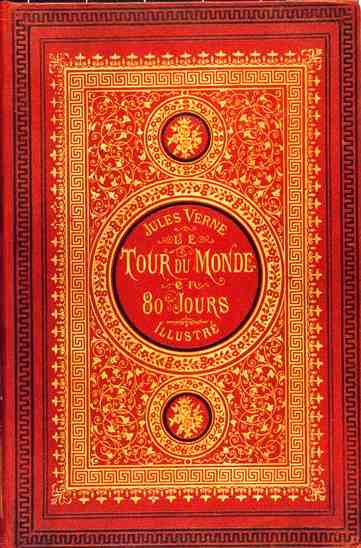
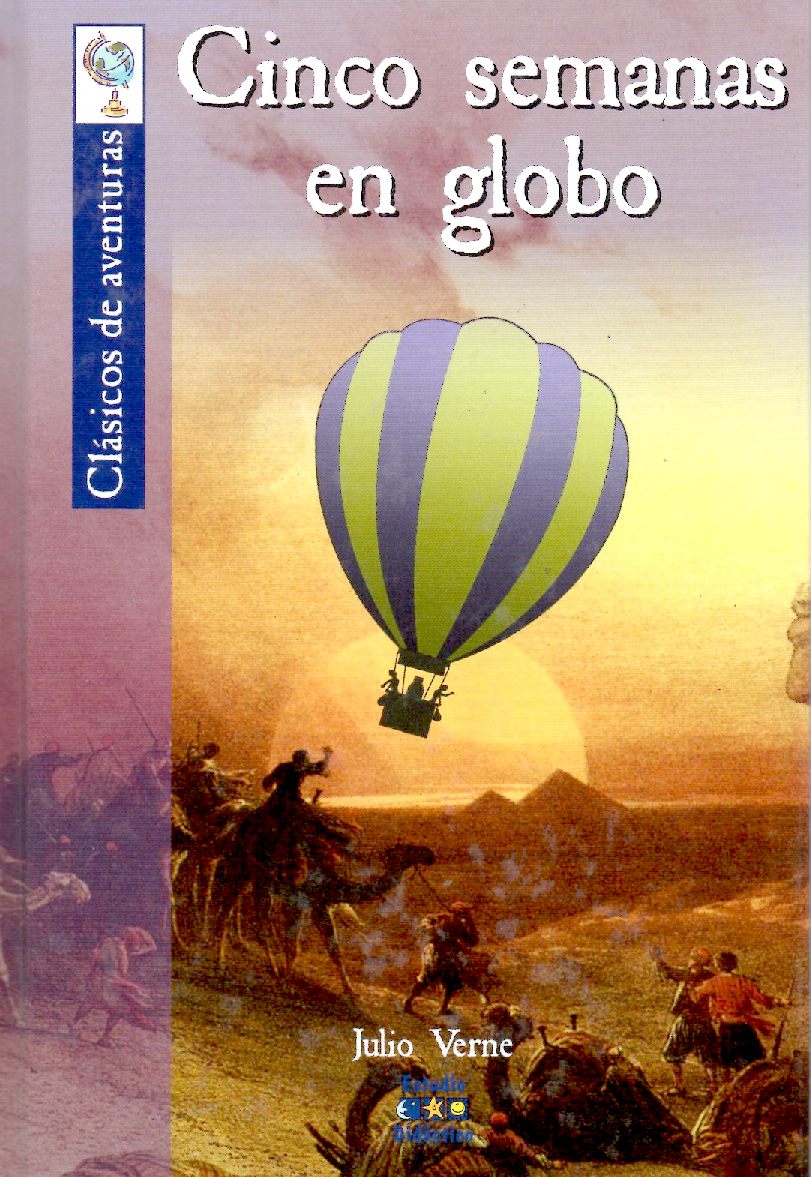
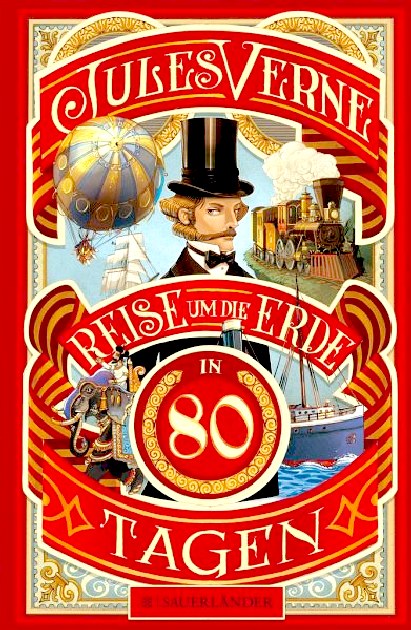
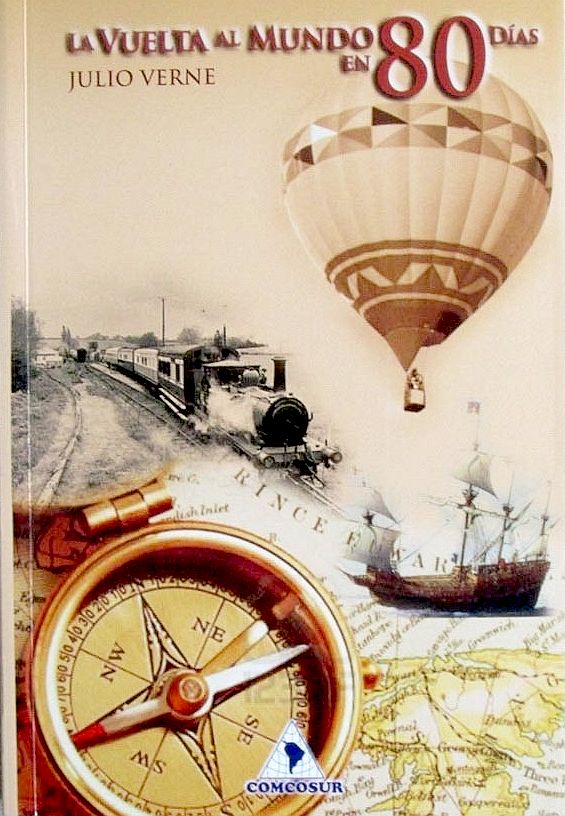

Many
of his stories today seem a little tame, as technology has caught up
with the imagination of the extraordinary French author, and Hollywood
has discovered Computer Generated Images (CGI) allowing super heroes to
grace our screens as never before. Computers are one thing that Verne
did not imagine or seek to portray.
Beginning in late 1872, the serialized version of Verne's famed Around the World in Eighty Days (Le Tour du monde en quatre-vingts jours) first appeared in print. The story of Phileas Fogg and Jean Passepartout takes readers on an adventurous global tour at a time when travel was becoming easier and alluring. In the century plus since its original debut, the work has been adapted for the theater, radio, television and film, including the classic 1956 version starring David
Niven. The TV series starring Pierce Brosnan released in 1989, runs for around 6 hours on
2 DVDs. A BBC
TV travel documentary starring Michael Palin, was also screened in
1989. A second TV series starring David Tennant was produced by the
BBC for 2021.
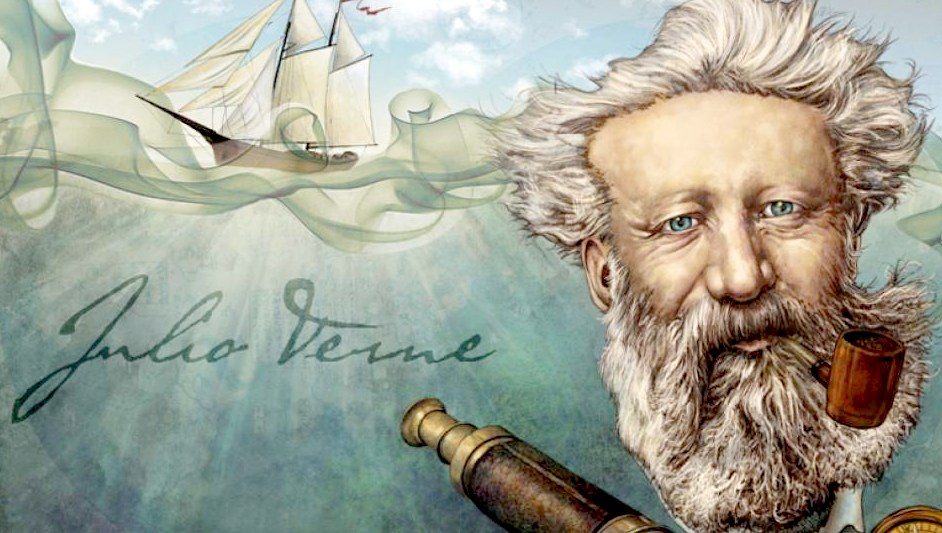
Jules
Verne is known as the Father of Science Fiction
Where
Jules Verne's suggested that it might be possible to travel Around The
World In 80 Days, we would like to extend that ethos to include
traveling in a Zero
Emission yacht (ZEWT or ZEV) driven by electric
hydro-jets? With the advent of solar power and liquid
hydrogen, it is a distinct possibility - on a scale of the wager
that the legendary Philleas Fogg entered into at the Reform Club in
1872.
|







